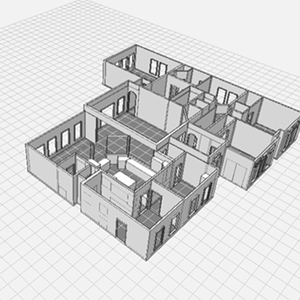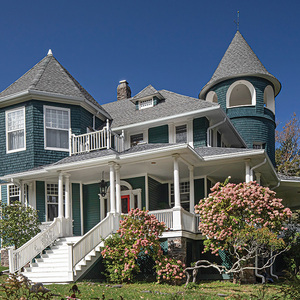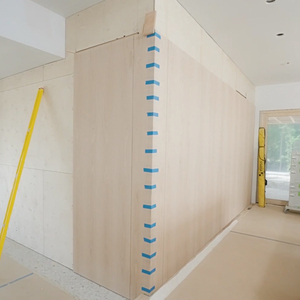Any heating pros care to comment on the advantages of the W-M Ultra versus their GV?
We’ve a 2200 sf main floor to heat with underfloor PEX radiant, with some Runtals to supplement things in a few cool spots with lotsa glass.
More to the point, are the advantages worth the extra cost?
I have asked this quesion over on the Heating Help “the Wall” page, and have some replies. We’re just looking to see if anyone here has comments, that might not be seeing the post there.



















Replies
If you compare boilers with similar capacities, say an ULTRA 105 vs a GV-4 at RFH temperatures then the physical comparison is:
MBH 94 92
AFUE 98.1 87.3
WEIGHT 155 320
$LIST 3585 2540
Both come with Taco circulators, both are sealed combustion. The Ultra is smaller, lighter and has better controls and is a condensing boiler. At low temperature applications, like infoor heating, you have to take care not to condense flue gases or shock the cast iron section(s) in the GV (and every cast iron, non-condesing boiler).
With a 10% better efficiency, built-in (standard on every ULTRA) outdoor reset, a 5 to 1 turndown ratio, a 5 year parts and labor warranty, the far superior controls, the simplicity of installation and operation, the ULTRA is a far better value. If you live in a climate where subzro temperatures are normal in the heating season, the simple payback in fuel costs alone is about 5 years.
"More to the point, are the advantages worth the extra cost?" In this professional's opinion, absolutely.
I'm not at all certain about this, but wouldn't the Ultra be a direct vent and the GV need a flue then? I would think that this could also impact the cost in that not needing a flue for the GV saves money. Of course some people may not like looking at the PVC piping of direct vent models.
"... but wouldn't the Ultra be a direct vent and the GV need a flue then?"
By the way I use the term "direct vent" meaning combustion air is piped/ducted directly to burner and flue products are pipe/ducted directly outside, both of these are direct vent/sealed combustion boilers. The GV cannot be vented in PVC because of the temperatures. By definition, any pipe or duct that exists for the purposes of removing products of combustion directly from an appliance to the outside, is a flue, whether made from PVC or 26 ga steel.
Do you really want a boiler? Others point out that running a boiler at the lower temp used for floors is not very efficient.
More and more radiant floor guys use a water heater rather than a boiler, they can be more efficient and don't mind operating at the lower temps that radiant floors call for.
The cost of a water heater can be dramatically lower and while the boiler may have a longer life span, that longer life span has a down side as well, in that it's's pretty tough to replace a boiler when more efficient designs come out however when you are speaking about the much lower cost of a water heater it's far easier to remain with the most efficient system out there.
Here in Minnesota I often see two or three water heaters in a house rather than a boiler. The numbers still dramatically favor a water heater even in those applications.
Yup, I've got three, er, actually FOUR...one to heat the garage/workshop slab, one for DHW, and one to back up the electric "boiler", which is really a SIESCO instant WH that has been modified and listed for space heating. It modulates automatically to supply a constant output temp from 95* to 130*.
Total investment (including the back-up I got for $50 from BIL who converted to peak demand electric) was less than $900.
Though called "boilers," the units used for heating water for hydronic radiant systems don't boil the water.
Check specs for brands like Weil-McLain and Buderus. They make steam units, for old-fashioned steam heat, and hot water units. But they are all called boilers.
"Do you really want a boiler? Others point out that running a boiler at the lower temp used for floors is not very efficient."
I don't what "others" point out such nonsense, but it is just that. A water boiler, designed for low temperatures, like the W-M Ultra is over 98% efficient. There is not a gas-fired domestice water heater on the market in this country that approaches that level of efficiency. Other boilers are well into the 90%, Munchkin, is one, there are others that don't come to mind right now.
DWHs are not rated in AFUE, but usually an "energy factor" and seldom above 0.80 . They are not rated for continuos heating service regardless of how many misinformed individuals have decided to use them as a sole source of heat. They are significantly cheaper than water boilers, but you get what you pay for. I use a tankless gas water heater and tubes in the slab to heat my garage. For supplemental heating applications, such as a basement, shop or garage floor, that is fine. If you were to buid your house around DWH as a source of heat you have made a mistake, that was cheap to make but that will be expensive to bring up to "acceptable".
"They are not rated for continuos heating service regardless of how many misinformed individuals have decided to use them as a sole source of heat. "
Rated by whom? The ones I use, a Rheem and an AO Smith, both plainly state "for space heating" in the instruction manuals.
"If you were to buid your house around DWH as a source of heat you have made a mistake, that was cheap to make but that will be expensive to bring up to "acceptable"."
So if one were to decide later to go with "acceptable" you'd be out, what? $200 - $300 for a WH that you wouldn't have had to buy?
Provide some details. Model numbers would be plenty. Show me one domestic water heater manufacturer that has an AFUE, DOE output or an I-B-R rating. These are the primary ways heating equipment is rated in this country. All water heaters out here, have a single, simple statement thate reads "suitable for water heating and space heating". That simply means that it is not going to hurt you if you use this for this purpose. IT IS NOT the same as to what I refer.
You have found a cheap way to heat you house. Good for you. However, what you have done is created a cheap temporary heating system, that might last 10 years, might last 15. If the rest of you house was done with the same eye to quality and longevity, the vinyl will begin to fail about the time your first water heater fails.
What it would cost to replace the 3 water heaters that you are using in lieu of a boiler, is cost of the boiler and the installation and markup of same. For those who don't go to the local salvage yard for their equipment, this will cost $4000 and up, at todays prices. BTW, if you have priced new water heaters in the last month, you wion't find much at $200.
Points well made.
But when I think of "heating system" I think of everything involved, including the heat loss side...the envelope (open floor plan, state of art insulation and sealing detail, and window package), solar siting, protection from cold prevailing winter winds, distribution and control system, heat source, and fuel type.
The boiler or water heater question is only one factor of the total system, and one that can and should be designed in as an option.
I agree that the heat generator is only one piece of the puzzle. My point is that, yes, a water heater is an option, but it is an inefficienct and low cost option. In most things in life, when you cut costs, you get what you pay for.
Look at the design of the common residential water heater. It is an insulated steel tank, glass lined typically, with a fire underneath it and hole up through the middle. Although inexpensive, simple and effective for turning cold water into hot/warm water, it is a rather crude device. Barley a step above a big tub over a pile of logs.
State of the art, commercial gas water heaters that approach the efficiencies attainable by common residential heating boilers, are very expensive. Typically much more so than the boilers we are discussing. Run of the mill residential gas water heaters operate at 60 to 65% efficiency. The costs saved up front, is paid over and over and over, every year.
Granted all that...and I wouldn't hesitate a minute IF a boiler, even one that modulates down to the supply/return temps that my design calls for, made sense.
I'm heating 1600 sq feet, with a plated sleeper PEX sandwich under a variety of finished flooring, in a 6600 HDD climate. Heat loss on a 80 degree delta design day is less than 25K BTU/hr. Passive solar shuts the whole system down on sunny days even when outside temp is below zero.
I'm heating with 95* supply/ 90* return during mild weather, 110*/105* with overnite lows in the 15* - 20* range, and I crank it up to 130*/125* with below zero nights. Point being that I will NEVER even approach the 180* water that a boiler is so efficient at making at much higher BTU output than I will EVER need. Even with out door re-set and a condensing boiler, does it make sense to have all that supremely designed horsepower just sitting there?
So in my case, most boilers would be overkill. Even the smallest Munchkin at minimum puts out 16KBTU/hr. I'll take my WH thankyou.
Edited 2/25/2005 11:32 am ET by johnnyd
The short life is one of the benefits of using a water heater instead of a boiler. My basic Sears unit that is 21 years old refuses to quit. My only maintenance is the use of a filter and an annual flush. Too bad, I'm certain that water heaters have improved in efficiency since this one was installed. When it fails I'll gain efficiency. A boiler on the other hand is very tough to replace with more efficient models. The thousands invested are tough to shell out, often a repair will get the old boiler running again and few repairs on a boiler would ever approach the cost of replacement.
My brother-in-law is saddled with just that. He has a 15 year old boiler that was converted to run radiant in floor heat. The minimum temp it runs at is way too hot for use with the tubing, thus forcing him to cool the water that he just heated.
I've priced water heaters several times (expecting my tired old Sears unit to give up) and the highest efficiency models are in the few hundred dollar range. Now I won't begin to claim that Sears makes the best unit, but if a cheap Sears unit lasts this long how can it hurt to replace it with another water heater?
At the risk of hi-jacking this thread, has anyone ever explored the real cost of gas vs electric? Not just that electric will cost as much as a third more but Gas requires a exhaust stack. One that will take heated air out of the house 24/7/365 It's even worse if the stack has to go all the way to the roof rather than being power vented.
The efficincy, especially in water heaters that today cost less than $500 are about the same as they were 30 years ago. The controls have improved slightly. In case you haven't shopped for these in 2005, everyone's prices have increased. If you can find a new water heater (large enough for an entire house, say 40 gal or more) for $300, that is more that 80% efficent, I would be surprised, though it might be possible for a few more months.
"The minimum temp it runs at is way too hot for use with the tubing, thus forcing him to cool the water that he just heated. " I'm going to assume that his system uses a mixing valve to blend boiler supply with return water to acheive the low temperatures typically seen in in-floor hydronic heating setups, and he doesn't actually "cool" the water. If that's not the case, he and/or you are not quite up to speed on these issues and should seek the services of a competent heating contractor in the matters.
"At the risk of hi-jacking this thread, has anyone ever explored the real cost of gas vs electric?" I have explored this at length in various different instances. With proper planning and design, the issues such as " One that will take heated air out of the house 24/7/365.", (which, btw, is a gross oversimplification and simply doesn't occur) do not outweigh the operating costs of heating with electricity. Life cycle cost, assuming some limited life of equipment, and avergage utility costs, and I have done dozens of these comparisons, has never, in my area (midwest) ever been close. Electric heat never wins beyond first cost.
Timbo,
Thank you for your explanations they seem very well informed and accurate. Please don't be offended if I do further research to confirm your statements. ( it's very hard to change a well defined opinion <G> ) To give you full credit I haven't shopped for a water heater this year, I'm waiting until the house is completed, maybe that's foolish? Yes, last time I looked I found a couple of water heaters in that 80%+ range for under $500.00
Regarding the mixing valve used by my brother-in-law. My error, I assumed that took make-up water and added it to the heated water.
Could you elaborate on your statement regarding gas water heaters not taking heat out of a building? I can go up to the roof of my house today and hold my hand over the exhaust flue of the water heater and even if the water heater isn't on, my hand will be warm. Why isn't that not taking heat out of the building?
One final comment. I have a reasonably new and efficient gas forced air furnace that will remain my prime heat source until the house is finished. It replaced a 25 plus year old furnace at the insistence of the gas company. yet the heating bills for that furnace are dramatically higher than my old furnace. I've had technicians check it and clean it and recheck it and still the heating bills are at least 50% higher than the old furnace. With the old furnace my bills were seldom over $100 for the worst month and yet December was over $540.00 OK natural gas is up but 500%? in five years?
" I can go up to the roof of my house today and hold my hand over the exhaust flue of the water heater and even if the water heater isn't on, my hand will be warm. Why isn't that not taking heat out of the building? "
In your case, heat is leaving your house, now. But you stated this occurs 24/7/365. While it is true that a simple, open flue will allow a small amount of heat to escape during cold months. I don't know where you live, but in my neck of the woods that would occur 4 months of the year. An open, gravity flue is an incomplete installation. Present good practice includes a damper in the flue adjacent to or within the draft hood. In large systems, i.e. boilers, commercial water heaters, this is standard. If you have an old natural draft gwh, the low efficiency is where you waste the most. Typically, the appliances are in a mechanical room to which you do not intentionally add heat, unless freezing is a concern.
http://www.bradfordwhite.com/products.asp?category=Residential_Hydronic/space_Heating/storage_Tank/indirect-fired&id=11http://www.bradfordwhite.com/pdfs/def_residential/551.pdf
You got me on the AFUE rating for the gwh. Howerver, the best water heater available is still not designed and intended for use as a heating boiler. They have been adapted for the use. As they are adapted to the work of a boiler, their costs and compelxity increase.
The larger of the 2 Bradford Whites has an input of 76 mbh, and 82% efficiency. It has a list price of $1414.00
An induced draft Weil-McLain CGi-4 has an input of 100 mbh, and 84% efficiency. It has a list price of $1709.00 .
The cheap ones out there will spring for neither of these. To heat a house, I will go with the boiler every time.
Have you ever installed Viessmann or Buderus boilers ? The people who do our heating work use mostly W-M units and don't really stray too far. I am just curious about the cost difference between these units and the W-M boilers. Why would I choose a Viessmann over a W-M ?
Many of the advertised installs of Viessmann units (ads by installers) show beautifully laid out components which come as prepackaged "units" to speed install.
While the whole thing looks clean, I have a feeling there is a hefty price tag to go with.
carpenter in transition
Tim,
I am not an installer. I am a mechanical engineer and I design and troubleshoot HVAC systems, including steam and hot water boiler systems, and I design some plumbing systems as well.
I have seen a Viessmann installation and it is an impressive piece of equipment. It is also a high end item, as far as I know. I have never seen a Buderus, but did some reaserch on them years ago when I was renovating my own home. I don't remember the details of their products. Given the domestic alternatives, as I recall, the Buderus didn't seem all that impressive.
Weil-McLain has oil burners, and they are very good basic units. Viessmann excels in this area where other do not. My familiarity with Viessmann is limited. I sell Weil-McLain boilers every day. I don't even know where to buy a Viessmann.
"Why would I choose a Viessmann over a W-M ?" Why would you choose a Mercedes over a Lincoln? Or a Cadillac? et al.
One of my best friends is an HVAC installer. 95% of what they install for boilers are smith and weil mcclain. He loves them because they are the best basic/standard boiler on the market. I think its a lot like cars, carbs are much simpler than fuel injected. I talked to a supply house the other day about Viessman's. In my area outside Boston, a 4 section oil fired Weil Mcclain with the burner is $1600 (complete package, ready to pipe), the smith is about the same. The supply house said a similar Viessman would be $2500 to $3000 depending on the control package you choose. From what I've been told, the Viessman will pay for itself over time because it is a much more efficient, hi-tech boiler. The insulation is 3" vs. 3/4" for the WM, it also has an outdoor temperature sensor which tells the boiler to run at a lower temperature when the weather is warmer. Heres an article that I found the other day that talks about Viessman's. When we replace our 25 yr old ultimate oil boiler this fall, we're going with a viessman. My buddy will be pissed but he'll get over it.
http://www.tjsradiantheat.com/heatsavings.html
Thanks for the link.
I'm in the same boat. Our HVAC installer does good work and provides great service but uses Weil-Mclain equipment. Their boiler installer does a half decent job. Not always a thing of beauty when done. I don't think they do Veissmann installs and I don't want to be their first.
We have someone 5 minutes from here who specializes in Veissmann installs but have never worked with the people. Their website is great and their work looks good on it. I have this feeling that their install price will be significantly higher and I want to make sure that it is worth it. I would lean more towards a propane setup over oil for a couple of reasons.
I'm not worried so much about pissing off my regular guys because I might have them do the ductwork for the AC anyway. In this area, I wouldn't think of using anyone else.
I guess I'm just looking to see if I spend an extra $3000 on a Viessmann am I getting anything more than a pretty boiler room ? Your artice does help in this regard.
Here is a link to the local firm I mentioned:
http://climatecadvanced.com/
carpenter in transition
My guess it the viessmann would be quite a bit more than a wm. Just like Mercedes dealership charge more for a muffler, oil change, or what ever than a GM dealership does, because they can. I don't think the piping is going to be all that different than a WM, it just more electronics. If you talk to the Viessmann installers, go check out a few of their jobs and pick their brains about the differences. I think where the Viessmann's are already a package setup, your regular crew could probably handle it. My HVAC will do the Viessmann for nothing, we just take care of each other when it comes to things like that. He can't do a lick of carpentry and the account balance is pretty high in my favor. So I'll get the Viessmann with everything installed for the cost of the boiler, $3k. We'll stay with oil, propane up here is too expensive.
Most water heaters have an afue of less than 50%. Ever notice they don't list an afue for water heaters? They call it energy efficiency or something similar at .48 That .48 is equal to 48%. Most CI boilers will be a minimum of 80% and condensing boilers 92+. Combustion efficiency is not the same as afue. The Viessmann vitola boiler is probably the best CI boiler made. It has a wet base, and can handle 50F return water temps, even though it is not a condensing boiler. Running it without the pump running will not void the warranty. Buderus is in the same class as Viessmann.
So, how does the new W-M "Ultra" stack up?
Have not installed one yet, but like all the other low mass condensing boilers, piping and load matching is critical. I've used the Trinity from NTI and it is working well. FWIW, low temp zones can be used with CI boilers. Go to tekmarcontrols.com Lots of info on controls.